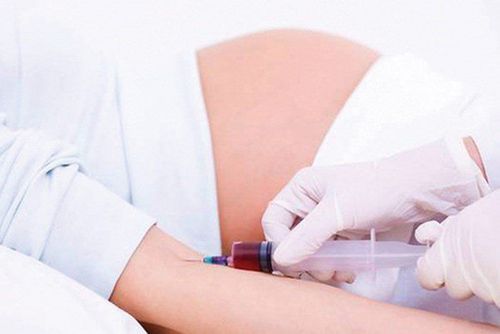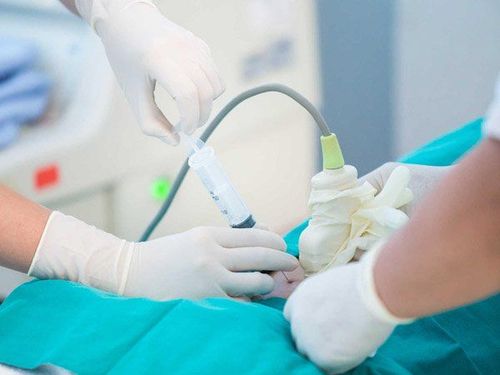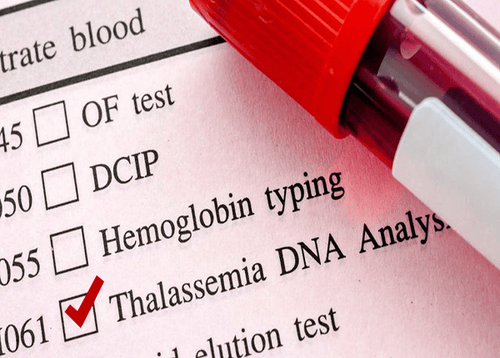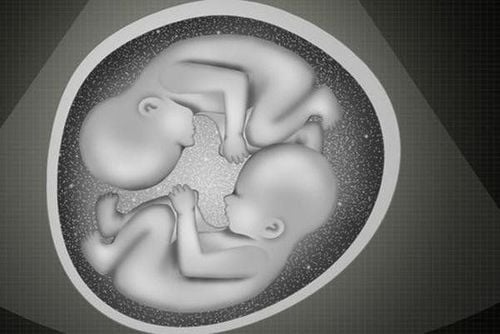This is an automatically translated article.
The article was professionally consulted by Specialist Doctor I Truong Nghia Binh - Obstetrician-Gynecologist - Department of Obstetrics and Gynecology - Vinmec Da Nang International General Hospital.
The first trimester (first 3 months of pregnancy) is the time for prenatal screening to detect certain genetic disorders in babies, especially Down syndrome (trichromosomal trisomy). 21) and trisomy 18.
1.An overview of prenatal screening tests in the first trimester of pregnancy
Prenatal screening during the first trimester of pregnancy consists of two steps:A pregnant woman's blood test to measure the levels of two substances that are particularly present during pregnancy, namely: pregnancy - associated plasma protein - A (PAPP) - A), and human chorionic gonadotropin (HCG). Fetal ultrasound to measure the size of the opacity at the back of the fetal nape. Usually, prenatal screening during the first trimester of pregnancy is done between 11 and 14 weeks of pregnancy.
Based on the age of the pregnant woman, blood test results, ultrasound results, the specialist can predict the possibility of the fetus having Down syndrome or trisomy 18.
If the final results indicate moderate or high risk, additional prenatal screening tests should be performed to provide a more accurate determination.
2. Why should prenatal screening test in the first trimester of pregnancy?
Prenatal screening in the first trimester of pregnancy is done to assess the risk of a baby having Down syndrome and trisomy 18.Down syndrome has lifelong defects. mental, social development as well as physical problems in the child. Trisomy 18 is more serious, and usually the child dies by the age of 1.
Prenatal screening during the first trimester of pregnancy does not assess the risk of neural tube defects, such as spina bifida.
Prenatal screening during the first trimester of pregnancy has the advantage that it can be performed earlier than other prenatal screening tests, thus offering the possibility of earlier risk assessment. This means you have more time to think about your options for additional prenatal screening tests, think about your pregnancy, treatments, and problems. during labor and postpartum. If the fetus is at high risk for Down syndrome, the pregnant woman also has more time to prepare for special care for the baby later.
Other prenatal screening tests may be done later in pregnancy. For example, test four is a blood test done between 15 and 20 weeks of pregnancy. The advantage of the quadruple test is that it not only assesses the fetal risk of Down syndrome, a trisomy 18 disorder, but also includes neural tube defects (eg, spina bifida). Your doctor may combine all the results of the first trimester prenatal screening test with the results of the quadruple test to increase your accuracy when predicting the likelihood of your baby having Down syndrome.
The results of prenatal screening tests during the first trimester of pregnancy only indicate the risk that the fetus may have Down syndrome or trisomy 18, not conclusively determine whether the fetus has infected or not.

3. Is there any risk in the antenatal screening test during the first trimester of pregnancy?
Prenatal screening during the first trimester of pregnancy is completely safe, with no risk of miscarriage or any other complications.4. What preparation is required before having a prenatal screening test in the first trimester of pregnancy?
Pregnant women do not need to do any special preparation before taking prenatal screening tests in the first three months of pregnancy, even eating and drinking pregnant women do not need to fast or abstain at all.5. What is the process of prenatal screening test in the first trimester of pregnancy?
Prenatal screening tests in the first trimester of pregnancy must include blood tests of the pregnant woman and do an ultrasound.With a blood test, the medical staff will usually take a blood sample from a vein in the woman's arm, which will be taken to a laboratory for analysis.
When doing a pregnancy ultrasound, the doctor will use a transducer placed on the pregnant woman's abdomen to emit and receive sound waves. The reflected waves will be displayed as images on the screen, and looking at the screen, the doctor will measure the size of the space at the back of the baby's nape. Ultrasound is completely painless, completely harmless.
6. How to judge the results of prenatal screening test in the first three months of pregnancy?

Prenatal screening during the first trimester of pregnancy can correctly identify about 85% of pregnant women with a fetus with Down syndrome. About 5% of pregnant women have a false positive, that is, the result is positive but in fact the fetus does not have Down syndrome at all.
When receiving the results, pregnant women should note that prenatal screening tests in the first trimester of pregnancy only show the possibility, the risk of the fetus having Down syndrome or trisomy 18. A dangerous result. A low risk does not guarantee that the fetus will not have the disease, and conversely, a high-risk outcome cannot confirm that the fetus has the disease.
If the result is positive, the doctor will discuss and consult with the pregnant woman, including conducting other screening tests, such as:
Acellular DNA prenatal screening test: here is a complex blood test that will check the fetal DNA in the pregnant woman's blood, to determine the risk of the fetus having Down syndrome, trisomy 13, trisomy 18. In addition, acellular DNA prenatal screening test can check for other genetic disorders. If the results are normal, there is no need for additional invasive prenatal screening tests. Chorionic villus biopsies: chorionic villus biopsies can analyze the genetic status of the fetus. A placental biopsy is usually done in the first three months of pregnancy, when performing the technique, a sample of the placenta will be taken for testing. However, chorionic villus biopsies have a small risk of miscarriage. Amniocentesis: Amniocentesis can both identify genetic disorders (such as Down syndrome) and can detect neural tube defects (such as spina bifida). Amniocentesis is usually done during the second trimester of pregnancy, during the procedure, a sample of amniotic fluid is taken for testing. Amniocentesis also has a small risk of miscarriage. At Vinmec International General Hospital, a full range of prenatal screening tests and fetal malformation screening services are applied for accurate, fast and safe results for the mother. In addition, Vinmec Health System deploys all-inclusive maternity packages, taking care of mother and baby's health from before birth - during childbirth and after birth.
To know more about Vinmec maternity packages, you can contact Vinmec health system nationwide HERE.
Specialist doctor I Truong Nghia Binh has over 13 years of experience in the field of Obstetrics and Gynecology, has high expertise and long experience in diagnosing and treating Obstetrics and Gynecology diseases such as: screening for diseases of mother and baby before birth chorionic villus biopsies, amniocentesis.. Ultrasound to screen for fetal malformations (3D, 4D ultrasound) Follow-up, birth control in cases of normal or difficult birth treatment of pre-eclampsia, placenta previa, pregnancy with complicated medical conditions... Cesarean section for 1st, 2nd, 3rd time caesarean section... Examination, treatment treatment of gynecological diseases. Examination and consultation for infertile couples
Please dial HOTLINE for more information or register for an appointment HERE. Download MyVinmec app to make appointments faster and to manage your bookings easily.
Article referenced source: Mayoclinic.org













